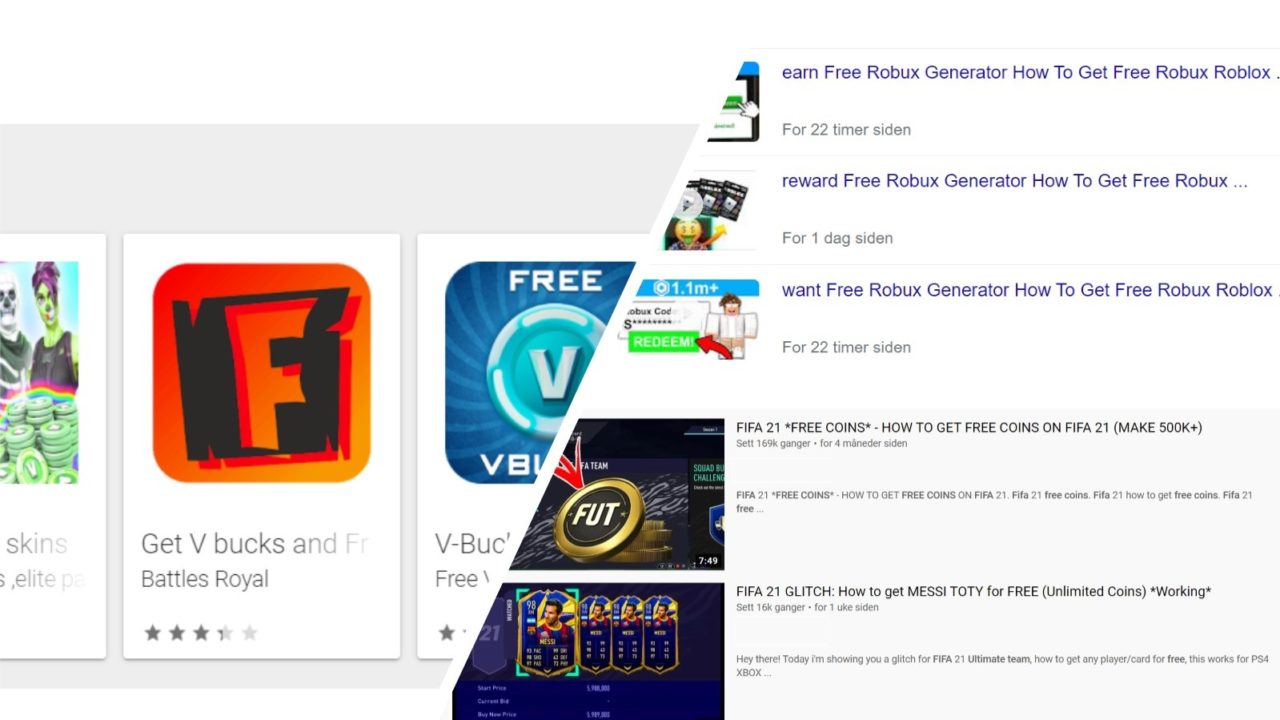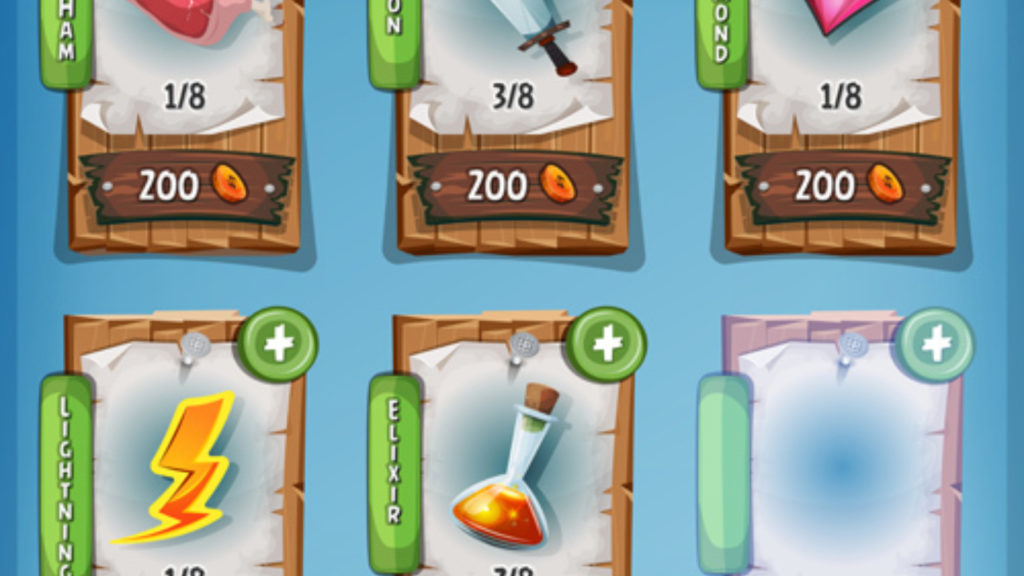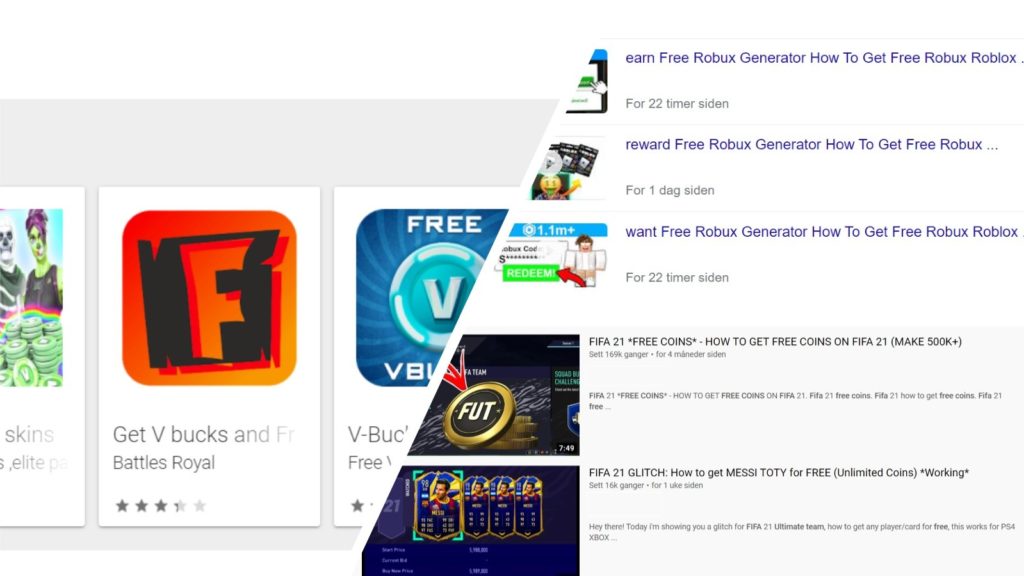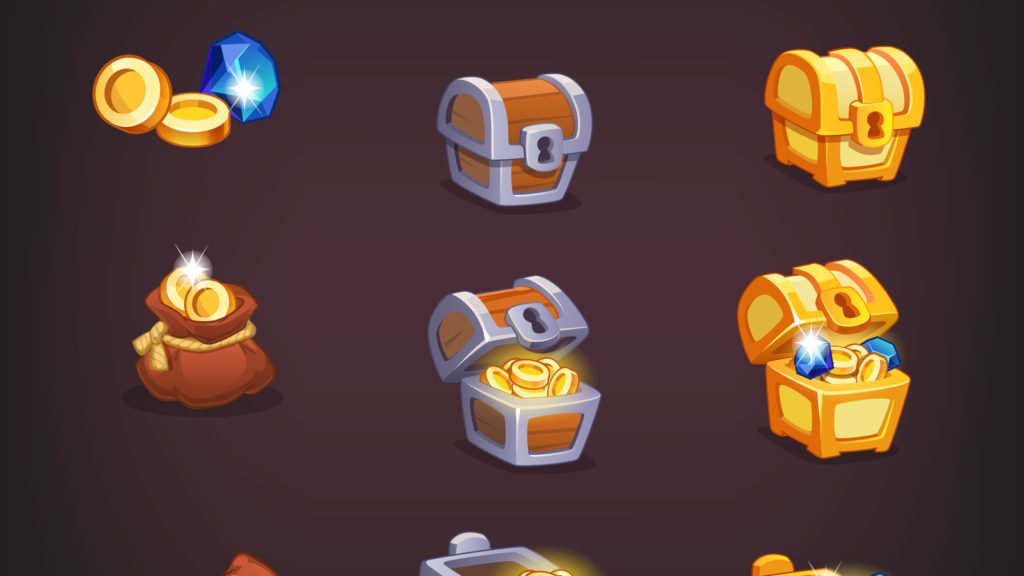
Fake and ‘free’ game currency
There are a lot of suspicious websites, apps, and videos on the internet promising free game currency for Fortnite, FIFA, and Roblox. Most often it is fraud and deception.
Choose language in the Google-box below. Some translations may be flawed or inaccurate.
It is easy to understand when children want a new bike or a mobile phone. But that the same kids are nagging for buying a new «skin» in Fortnite, a gold pack of coins in FIFA, or plenty of currency in Robux – what is the matter about that?
However, there is little doubt that digital goods found only in the video gaming world, bought for real money, can be as exciting as shopping for physical toys and clothing. At least from the children’s point of view.
Free games with optional purchasing options have become a big business now. This is a revenue model that gives game developers millions of dollars in revenue. A good example of this is Roblox and Fortnite making big money this way. And not least FIFA.
In addition, game stores manage the economy themselves with their own (sometimes confusing) exchange rate where so and so many V-bucks, Robux, FIFA points/coins equate to some amount of real money.

How many people buy in-game content for real money?
There are several types of in-game purchases you can make. Some change only the appearance of the character, others help you win the game by, for example, providing benefits faster. Here are some examples:
Cosmetic purchases: A new «skin» in Fortnite, or a new car in Rocket League. A new «skin» for the character in Among Us.
Purchases that provide advantages to the players: Purchase of Fifa football player card packs. Various games in the Roblox universe, such as the purchase of better weapons in Big Paintball.
In-game purchases have become quite common among children. Here are some figures from the Norwegian Media Authority’s studies:
- Fifty-eight percent of children between the ages of 9 and 18 have done at least one or more in-game purchases with real money.
- Almost 4 in 10 in the same age group have bought something with real money without asking their parents for permission first.
(Children and media, 2020)
What kind of websites promises children to give free in-game currency?
Getting a ‘no’ from the parents when a child really wants to buy something in games can be tricky. The alternative might just be a few keystrokes away. With some quick searches online, it’s easy to find multiple websites that promise free in-game currency.
Some examples of dubious sources are:
- Nonsense sites that link you to advertisements or other suspicious websites. For example, gambling sites.
- Subscription services where you are asked to enter a mobile number that signs you up for other expensive subscriptions.
- Programs that can be installed in the browser and can possibly monitor search history and activity in your browser.
- Websites that want to get children’s account (the game account) information (where they are asked to enter their password and username).
- Youtube videos that want more views and likes, or who try to refer to other suspicious websites.
- Apps that have vague promises but don’t really offer free in-game currency at all.
- Social media accounts with fake names like «free V-Bucks».
- Files that can be downloaded/installed on your computer and potentially contain viruses or malicious software.
Many sites look serious and have images and icons from the games they refer to. One of the sites we checked has an animation that spins and shows the in-game currency building up ready for withdrawal. Then you get a link to a page where you are directed to enter a mobile number to sign up for a subscription service. If you don’t read it in small print, it’s easy to sign up for an expensive agreement.
Another website requires you to sign up for an expensive subscription service before advancing to the process and being able to retrieve the alleged package of in-game currency.

What do the gaming companies say?
Several of the gaming companies are clear that it is only through them that it is possible to obtain in-game currency. Everything else is a fraud.
Roblox says that there is no such thing as a Robux Generator. Robux is purchased for real-world currency and is sold only by the Roblox company. If a person, website, or game tries to tell you that there is one, this is a scam and should be reported via our Report Abuse system.
Electronic Arts that has developed FIFA say: Don’t buy FUT Coins or engage in any type of Coin distribution to or from your account. Buy FIFA Points only from the FUT Store, your console’s store, or trusted retailers.
Epic Games, which has created Fortnite, writes that V-bucks can be obtained by purchasing in-game currency in the game itself, or by obtaining a battle pass (season pass).
Supercell behind Clash Royale also warns against websites that promise discounts on the purchase of jewels and diamonds (the game’s own currency). This is a scam. Often such services require login with, for example, Apple ID/Google Play that can give the scammers access to the account information. The scammers can do this to sell account information and bank card details to others.

How to avoid the children being tricked?
The procedure varies from case to case. The best and most preventive solution is to talk to your children about the fact that there are such websites that engage in fraud. You can’t get free in-game currency outside the official game stores.
Other tips and advice:
- Always use two-step verification on your children’s gaming accounts, so you have to enter a password/PIN received by email/SMS for each new login. This makes it harder for unauthorized persons to steal children’s gaming account.
- Keep a secure and good password on your game account.
- Talk to your children about not providing personal information to strangers and on suspicious websites.
- Block subscription services and premium-rate numbers (numbers that charge when you make calls) on your child’s mobile plan if offered by the mobile operator.
- Use parental controls on your child’s mobile/game console and PC to prevent your kids from downloading suspicious apps or paying for subscription services without entering a password as a parent first.
- Don’t have your bank card information easily available to your children, such as saving the card inside the games/app stores your kids use.
- Always have the latest version of the operating system up to date, and install and update antivirus programs and firewall on PC.
- Talk to your kids about not trusting strangers they meet while playing games, and websites that promise free in-game currency.
- Have clear agreements with your kids about how much and when they should be allowed in-game purchases. This may diminish some temptation to resort to other sources.
Read more:
Has your child emptied the bank card in an app or a game?
(Written on 25 September 2021. Translated from Norwegian to English by Ratan.)










